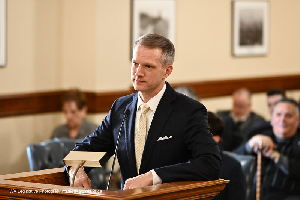Business News of Wednesday, 1 October 2025
Source: www.punchng.com
Zamfara mine collapse sparks host communities’ outrage
The Federation of Nigerian Mining Host Communities has raised an alarm over the growing frequency of fatal mining accidents in the country, following the collapse of a mine pit in Jabaka village, Maru Local Government Area of Zamfara State, which claimed 13 lives and left two others unaccounted for.
In a statement jointly signed by its Co-Chairs, Temitope Olaifa and Alhaji Abubakar Wushishi, on Tuesday, the federation described the tragedy as another avoidable disaster caused by negligence and weak regulatory oversight in Nigeria’s mining sector.
The Federal Government had confirmed the incident on Sunday through the Ministry of Solid Minerals Development, which disclosed that federal mines officers had been dispatched to coordinate rescue operations. According to the ministry, the collapse was triggered by heavy rainfall and worsened by illegal mining activities in the area. At least 15 itinerant miners were trapped when the pit gave way, with only lifeless bodies recovered.
“The collapse, triggered by heavy rainfall and aggravated by the unlawful activities of illegal miners, trapped at least 15 mine workers.
Thirteen of them have been recovered, tragically with no survivors,” the ministry’s Special Assistant on Media, Segun Tomori, said in a statement.
While extending condolences to the bereaved families, the FNMHC emphasized that the Jabaka disaster highlights the daily dangers faced by residents of mineral-rich host communities across Nigeria. The group insisted that the deaths could have been prevented had authorities and operators adhered strictly to safety standards.
“This preventable incident is yet another outcome of negligence, poor oversight, and the failure to apply proper safety measures,” the federation said. “These lapses continue to put lives at risk and must no longer be tolerated.”
The group drew attention to a worrying trend of repeated mining pit collapses nationwide. In August, a similar accident in Ihetutu, Ivo Local Government Area of Ebonyi State, left two miners dead. Just two months earlier, another pit caved in at Bazakwoi, Paikoro Local Government Area of Niger State, killing three and injuring one.
“These recurring tragedies underscore the urgent need for stricter enforcement of mining safety standards, accountability from operators, and stronger regulatory oversight,” the federation stressed.
Although the FNMHC commended the Ministry of Solid Minerals, emergency responders, and local volunteers for their rescue efforts in Zamfara, it maintained that reactionary measures were not enough. Instead, it urged systemic reforms to prevent such tragedies.
“The lives and welfare of host communities must always be placed above profit,” the group said. “Mining activities must be conducted with strict adherence to safety protocols, environmental protection, and respect for human rights.”
The federation therefore demanded an immediate investigation into the Jabaka collapse, strict enforcement of safety standards across mining operations, rehabilitation of abandoned or unsafe mining sites, and increased funding for the Mineral Resources and Environmental Management Committees to boost monitoring and enforcement.
It further called for stronger inclusion of host communities, particularly women, in decision-making around natural resource governance.
Nigeria’s mining sector has witnessed rapid growth in artisanal and small-scale mining in recent years, often carried out with minimal regard for safety or environmental rules. Analysts note that poor regulatory oversight, weak enforcement of laws, and the lure of quick profits have fueled repeated accidents, leaving host communities to bear the brunt of the consequences.
The FNMHC pledged to continue advocating for ethical and community-centred mining practices, while standing in solidarity with the people of Jabaka and families of those affected.
“We will not relent until Nigeria’s mining sector is made safer, more transparent, and more accountable to the people who live in and around these host communities,” the federation declared.












